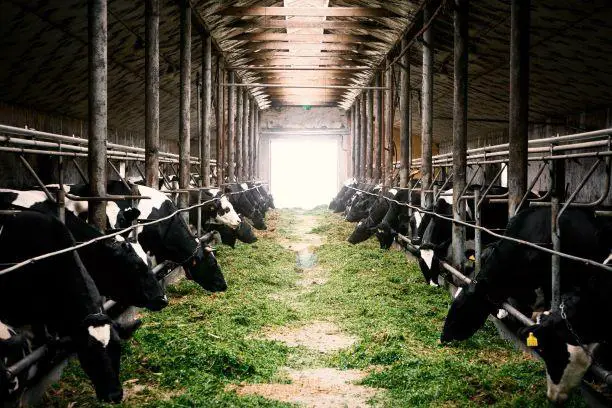The production of animal feeds in Kenya has always been seen as the main challenge affecting the quality and price of milk production, compared to other countries in the East African region. For example, the cost of animal feeds imported from Uganda tends to be affordable compared to those produced in Kenya, accounting for a huge percent of the production cost.
According to data from Kenya’s ministry of agriculture, feed currently accounts for 60 to 70% of livestock enterprise production costs.
While Kenyan farmers have relied on processed feeds from established companies, agricultural researchers have been pushing for the adoption of more nutrient-rich fodder crops to supplement the use of nippier grass and traditional pasture. For example, the International Livestock Research Institute (ILRI) and the Kenya Agricultural and Livestock Research Institute (KARLO) have been promoting the rollout of Bracharia, a vegetative grass that has its origin in Kenya but is now globally available.
According to Sita Ghimire who has been researching on the grass at the ILRI Kapiti ranch, 60 kilometers south of Nairobi, Brazil is leading in the use of the bracharia grass compared to Kenya, where it is native.
Apart from bracharia, there has been a push to diversify on the type of feeds produced which has led to the growth of the animal feed commercial farming. For example, Narok, Nakuru, Nyandarua, and Laikipia have seen the rise of new millionaires through the cultivation and sale of hay made from boma Rhodes, a drought-resistant grass that is in high demand among dairy farmers.
Kenya imports over 70% of the raw materials needed for manufacturing animal feed, the bulk of which consists of grain and oilseed cake by-products. In Kenya’s 2018/19 financial budget, the country removed the value-added tax (VAT) from animal feed ingredients, with the objective being twofold – to make feeds affordable to farmers and to attract investment in the sector.
The findings by Kilimo Trust, in the inter-regional trade landscape, Uganda and Tanzania dominate the export of bran (maize and rice) and sunflower seed cake respectively and Kenya is the biggest importer. In 2013, Kenya sourced 25, 848 MT of maize and rice bran and 29,543 of sunflower, and cottonseed cake from Uganda and Tanzania respectively.
Several organizations including USAID Feed the Future and local banks are already engaged in the process of financing farmers and players in the sector in producing quality feed to meet the market demand.
Read also: USAID Infuses Shs 520B Towards Farmer Cooperatives(Opens in a new browser tab)
Family Bank recently entered into a partnership with Performeter Agribusiness Limited in a deal that will see 100,000 farmers in dairy cooperatives access credit to finance fodder production, a critical barrier to the competitiveness of Kenya’s dairy sector.
Through this partnership, the Bank has set aside KES 1 billion to facilitate industrial production of fodder by financing the fodder production activities namely; land preparation, planting, fertilization, weed control, harvesting, ensiling, baling, and transportation, up to the point where the dairy farmer receives the fodder at the farm.
In addition to working capital financing to farmers, Family Bank will also finance enterprises involved in bulk procurement of dairy farming inputs and equipment. The capital expenditure includes expansion of the cold chain, set up of farm infrastructure, upgrading of milk processing facilities, and renewable energy at the milk processing plants, among others. The Bank will also provide working capital for milk processors to finance the purchase, processing, and storage of shelf-stable milk products such as milk powder during the flash season for sale during the dry season.
“The importance of the dairy sector to Kenya’s economy cannot be underscored. The dairy sector, like any other sector, has also been affected by the COVID-19 pandemic, and as a result, we are experiencing low milk production in the country. This is why Family Bank in partnership with Performeter, an experienced player in the dairy sector, has set aside KES 1 billion as financing to enable farmers to access working capital and other financial services to support the dairy value chain and unlock its growth potential to the entrepreneurial dairy farmers,” said Family Bank Chief Executive Officer Rebecca Mbithi.
“By working with dairy cooperatives, we believe that we can be able to target many small-scale entrepreneurs who contribute over 75% of Kenya’s total production and have an exponential growth effect of the sector in line with the President’s Big Four Agenda on food security,” she added.
CashCow is one of the flagship projects under the Big Four Agenda anchored on the Ministry of Agriculture Livestock Fisheries & Cooperatives and steered by the Kenya Dairy Board aimed at promoting industrial production of fodder in the country.
“Transforming Kenya’s dairy sector will require a concerted effort by key actors. The government has ample land resources that can be mobilized into industrial forage and fodder production and that will be the game-changer. A strategic intervention on fodder is the surest way to rejuvenate our dairy industry and move towards a net exporter status on milk, and as a sector, we can do this,” said CashCow Project Chief Advisor and a seasoned Industrial Economist Moses Nyabila.
The CashCow Project brings together many stakeholders in the dairy sector comprising of commercial banks, commercial fodder producers, dairy cooperatives, suppliers of seeds, fertilizer and machinery, insurers, contractors and milk processors who will play different roles to ensure production of up to 100,000 acres of fodder for use by dairy farmers.
